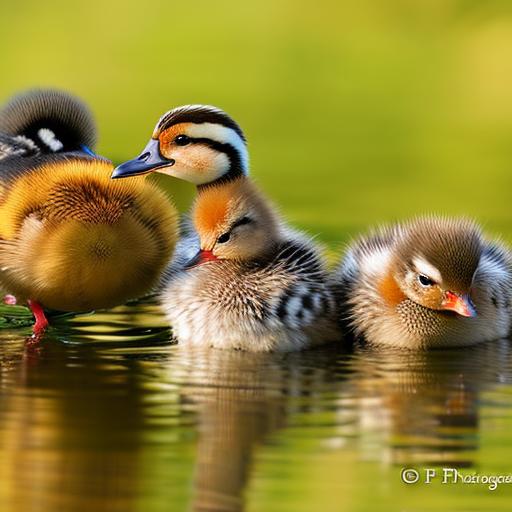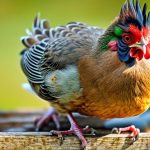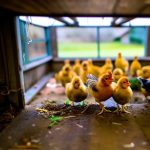Raising baby ducks and chickens together can be a rewarding and enjoyable experience. Not only do they provide fresh eggs and meat, but they also make great companions. I have personally raised mixed flocks of ducks and chickens and have found it to be a wonderful way to diversify my flock and enhance their overall well-being.
Key Takeaways
- Raising baby ducks and chickens together is possible and can be beneficial.
- Baby ducks and chickens have different needs and behaviors.
- Keeping mixed flocks can provide natural pest control and socialization opportunities.
- Housing and feeding requirements must be carefully considered for mixed flocks.
- Health and potential challenges, such as aggression, should also be taken into account.
Differences between baby ducks and chickens
There are several physical, behavioral, and nutritional differences between baby ducks and chickens. Physically, ducks have webbed feet and a flat bill, while chickens have claws and a pointed beak. Ducks also have waterproof feathers, which allow them to swim and stay dry in water, while chickens have feathers that are not waterproof.
In terms of behavior, ducks are more social and tend to stick together in a group, while chickens are more independent. Ducks also require access to water for swimming and cleaning themselves, while chickens do not have the same need.
Nutritionally, ducks require a higher protein diet compared to chickens. They also have a higher need for niacin, which is important for their growth and development. It is important to provide appropriate feed for both ducks and chickens to ensure they receive the necessary nutrients.
Benefits of keeping baby ducks and chickens together
Keeping baby ducks and chickens together has several benefits. Firstly, it reduces loneliness and stress for both species. Ducks are social animals and having the company of chickens can help alleviate any feelings of isolation. Similarly, chickens can benefit from the presence of ducks as it provides them with companionship.
Secondly, mixed flocks can help with pest control. Ducks are natural foragers and enjoy eating insects, slugs, and snails. By having ducks in your flock, they can help reduce the population of pests in your garden or yard.
Lastly, keeping baby ducks and chickens together can provide a more diverse range of eggs and meat. Duck eggs have a richer flavor and larger yolk compared to chicken eggs. Additionally, duck meat has a distinct taste and is often considered a delicacy. By having both ducks and chickens, you can enjoy a variety of eggs and meat options.
Housing requirements for mixed flocks
When it comes to housing mixed flocks of baby ducks and chickens, there are a few considerations to keep in mind. Firstly, the size and layout of the coop should be spacious enough to accommodate both species comfortably. Ducks require more space due to their larger size and need for water access. It is recommended to provide at least 4 square feet of space per duck and 2 square feet per chicken.
Nesting boxes and perches should also be provided in the coop. Ducks prefer to nest on the ground, while chickens prefer elevated nesting boxes. Providing both options will ensure that each species can choose their preferred nesting location.
A water source is essential for ducks, as they require access to water for swimming and cleaning themselves. A small pool or shallow container can be provided within the coop or in a separate area outside. It is important to ensure proper drainage to prevent flooding or waterlogging.
Feeding requirements for mixed flocks
Feeding mixed flocks of baby ducks and chickens requires providing appropriate feed for both species. Ducks require a higher protein diet compared to chickens, so it is important to choose a feed that meets their nutritional needs. Look for feeds specifically formulated for ducks or waterfowl.
Supplemental treats and foraging opportunities can also be provided to both ducks and chickens. Ducks enjoy foraging for insects, slugs, and snails, so allowing them access to a grassy area or garden can provide them with additional nutrition and mental stimulation. Chickens also enjoy foraging, so providing them with opportunities to scratch and peck at the ground can help keep them entertained.
Health considerations for mixed flocks

When raising mixed flocks of baby ducks and chickens, it is important to be aware of common illnesses and diseases that can affect both species. Ducks are more susceptible to certain diseases, such as botulism and duck viral enteritis, while chickens are more prone to respiratory infections and parasites.
To prevent illness, it is important to practice good biosecurity measures, such as keeping the coop clean and providing fresh bedding regularly. It is also recommended to quarantine any new birds before introducing them to the flock to prevent the spread of disease.
Regular veterinary care is also important for maintaining the health of your mixed flock. It is recommended to find a veterinarian who specializes in poultry and can provide guidance on proper care and treatment options.
Social dynamics between baby ducks and chickens
Baby ducks and chickens can have different social dynamics when raised together. Ducks are more social animals and tend to stick together in a group. They may form a bond with each other and may not integrate as closely with the chickens. However, they can still coexist peacefully in the same flock.
Chickens, on the other hand, are more independent and may not form as tight-knit of a group as ducks. They may interact with the ducks but may also prefer to spend time with their own kind. It is important to monitor their interactions and ensure that there is no aggression or bullying occurring.
Potential challenges of keeping mixed flocks
While there are many benefits to keeping mixed flocks of baby ducks and chickens, there are also potential challenges to consider. One challenge is the messiness of water and bedding. Ducks require access to water for swimming, which can lead to wet bedding and increased cleaning requirements.
Another challenge is the different dietary needs of ducks and chickens. Ducks require a higher protein diet and additional niacin, which may not be met by standard chicken feed. It is important to provide appropriate feed for both species to ensure they receive the necessary nutrients.
Lastly, there is a potential for disease transmission between ducks and chickens. Ducks are more susceptible to certain diseases, and if one bird becomes ill, there is a risk of it spreading to the rest of the flock. It is important to practice good biosecurity measures and monitor the health of your birds regularly.
Tips for successfully raising baby ducks and chickens together
To successfully raise baby ducks and chickens together, there are a few tips to keep in mind. Firstly, it is best to introduce them at a young age. This allows them to grow up together and form bonds early on. It also helps with integration into the flock as they are more accepting of each other when raised together from a young age.
Providing plenty of space and resources is also important. Ducks require more space and access to water, so ensuring that there is enough room for both species to thrive is essential. Providing multiple water sources and feeding areas can help prevent competition and ensure that each bird has access to what they need.
Monitoring their behavior and health regularly is also important. This allows you to identify any potential issues or conflicts early on and take appropriate action. It is also recommended to observe their interactions and intervene if any aggression or bullying occurs.
Is it possible to keep baby ducks and chickens together?
In conclusion, it is possible to keep baby ducks and chickens together with proper planning and care. While there are differences between the two species in terms of physical characteristics, behavior, and nutritional needs, they can coexist peacefully in the same flock.
There are several benefits to keeping mixed flocks, including reduced loneliness and stress, increased pest control, and more diverse eggs and meat options. However, there are also potential challenges to consider, such as messy water and bedding, different dietary needs, and potential for disease transmission.
By following the tips provided and being attentive to their needs, you can successfully raise baby ducks and chickens together and enjoy the many rewards they bring.
If you’re considering raising baby ducks and baby chickens together, it’s important to understand the dynamics between these two species. While they can coexist harmoniously, there are certain factors to consider. In a helpful article by Poultry Wizard, they discuss the compatibility of keeping baby ducks and baby chickens together. They provide insights into the behavior and needs of both species, offering valuable tips on how to create a suitable environment for them to thrive. To learn more about this topic, check out their article on keeping baby ducks and baby chickens together.
FAQs
Can you keep baby ducks and baby chickens together?
Yes, it is possible to keep baby ducks and baby chickens together.
What are the benefits of keeping baby ducks and baby chickens together?
Keeping baby ducks and baby chickens together can provide companionship and reduce stress for both species. They can also learn from each other’s behaviors and habits.
What are the challenges of keeping baby ducks and baby chickens together?
One of the challenges of keeping baby ducks and baby chickens together is that they have different dietary needs. Ducks require more niacin than chickens, which can lead to health problems if not provided. Additionally, ducks need access to water for swimming and cleaning, which can be messy for chickens.
What should I feed baby ducks and baby chickens if I keep them together?
It is important to provide a balanced diet for both species. Chick starter feed can be given to both, but ducks require additional niacin. This can be provided through supplements or by adding brewer’s yeast to their feed.
How should I house baby ducks and baby chickens together?
A secure coop with a separate area for water is recommended. The water area should be deep enough for ducks to swim and clean themselves, but shallow enough for chickens to stand in. Bedding should be changed frequently to prevent moisture buildup.
Can adult ducks and adult chickens be kept together?
Yes, adult ducks and adult chickens can be kept together. However, it is important to introduce them slowly and monitor their interactions to ensure they get along. Adult ducks may also require a larger water area than baby ducks.
Meet Walter, the feathered-friend fanatic of Florida! Nestled in the sunshine state, Walter struts through life with his feathered companions, clucking his way to happiness. With a coop that’s fancier than a five-star hotel, he’s the Don Juan of the chicken world. When he’s not teaching his hens to do the cha-cha, you’ll find him in a heated debate with his prized rooster, Sir Clucks-a-Lot. Walter’s poultry passion is no yolk; he’s the sunny-side-up guy you never knew you needed in your flock of friends!







